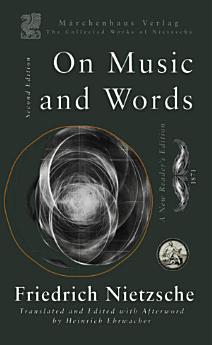On Music and Words: A New Reader's Edition
May 2024 · The Collected Works of Friedrich Nietzsche Book 15 · Marchen Press
Ebook
114
Pages
family_home
Eligible
info
reportRatings and reviews aren’t verified Learn More
About this ebook
This unfinished essay on Aesthetics is one of his earliest commentary on beauty, art and language. Here he asserts that music is the primary and more profound form of expression than language. He argues that words serve as mere accompaniments to the deeper, more universal language of music, which taps into the primal emotions and experiences of human existence. This essay foreshadows Nietzsche's later development of the Apollonian and Dionysian dichotomy in "The Birth of Tragedy," where he further elaborates on the interplay between the rational, structured world of words and the chaotic, instinctual realm of music. This manuscript is a fragment from 1871, published posthumously by his estate in 1901. These fragments, first published under the title "Nachgelassene Fragmente" by his sister, Elisabeth Förster-Nietzsche, along with other scholars, were then re-published in various formats after that -including in a series titled "Gesammelte Werke" (Collected Works), later reorganized and expanded into the "Gesamtausgabe" (Complete Edition), which included comprehensive collections of Nietzsche's notebooks and other writings from various periods of his life. This Critical Reader's Edition offers a modern translation of the original manuscript, designed to help the armchair philosopher engage deeply with Nietzsche's works. The translation features clean, contemporary language with simplified sentence structures and diction, making Nietzsche's complex ideas more accessible. In addition to the main text, this edition includes extensive supplementary material that enhances the manuscript with autobiographical, historical, and linguistic context. It contains an afterword by the translator examining the history, impact, and intellectual legacy of Nietzsche in relation to this work, an index of philosophical concepts with emphasis on Existentialism and Phenomenology, a complete chronological list of Nietzsche's published writings, and a detailed timeline of his life, highlighting the personal relationships that significantly shaped his philosophy.
About the author
Friedrich Nietzsche (1844-1900) was a watershed German philosopher, cultural critic, poet, musician (briefly) and philologist (the study of ancient manuscripts) whose work has had a profound impact on modern intellectual history. Known for his critiques of European morality and religion (particularly Protestantism), Nietzsche's ideas on the "will to power" and the "Übermensch" have influenced a wide range of philosophical, literary, and psychological thought including thinkers such as Martin Heidegger, Albert Camus, Michael Foucault and the entire Postmodern religion.
Rate this ebook
Tell us what you think.
Reading information
Smartphones and tablets
Install the Google Play Books app for Android and iPad/iPhone. It syncs automatically with your account and allows you to read online or offline wherever you are.
Laptops and computers
You can listen to audiobooks purchased on Google Play using your computer's web browser.
eReaders and other devices
To read on e-ink devices like Kobo eReaders, you'll need to download a file and transfer it to your device. Follow the detailed Help Center instructions to transfer the files to supported eReaders.











